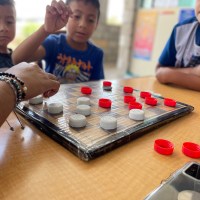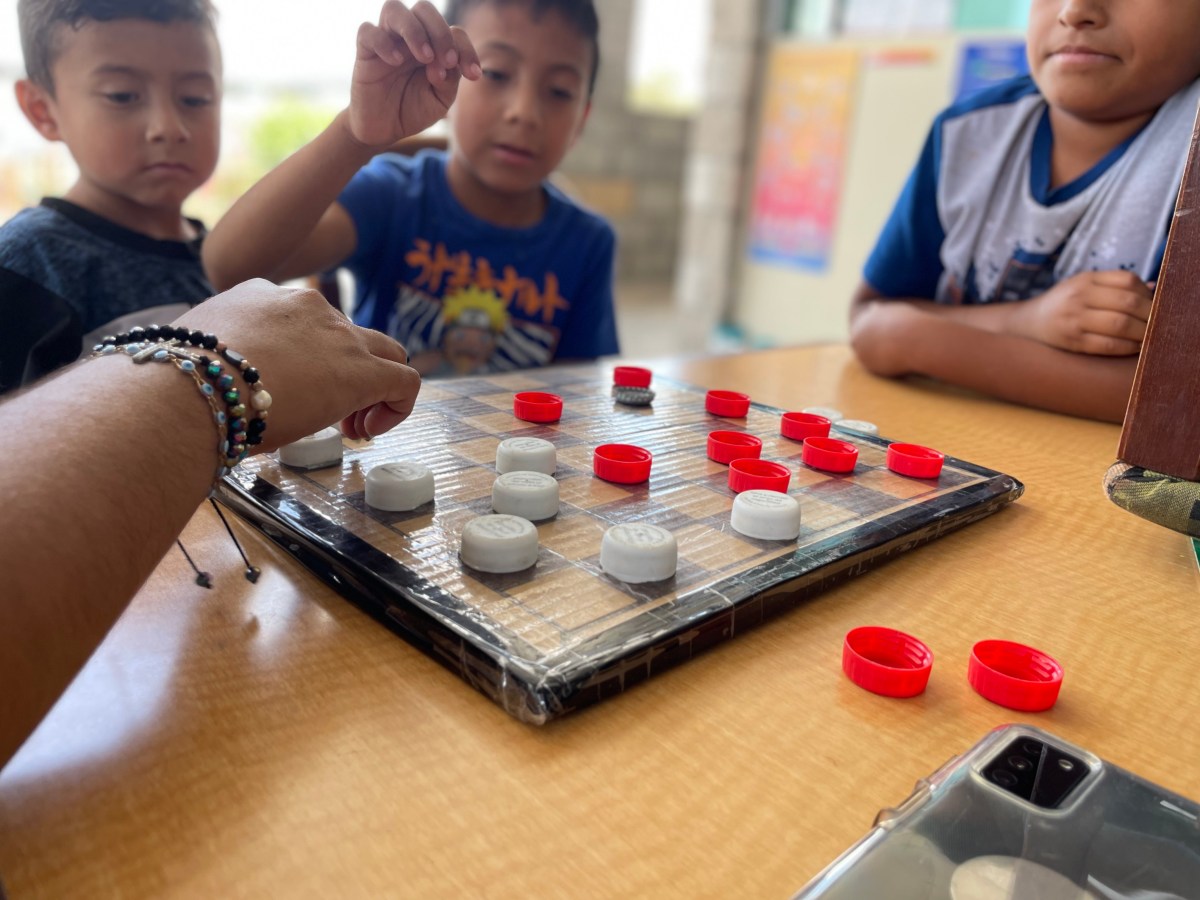Roberto* expertly whisks his piece across the checkerboard, winning the game in two moves. This game board is unique, hand-drawn with black marker on scraps of cardboard fastened together, with red or white bottle caps serving as the pieces. For eleven-year-old Roberto, the game is important. His father taught him how to play back when they lived together as a family in Guatemala.
Roberto’s father is already in El Paso, just nine miles from the Juárez shelter where Roberto and his mother have been waiting to cross. So close, yet for those waiting for appointments for their cases to be heard, so far. Roberto and his mother applied for an appointment on the CBP One app months ago. Despite the wait, Roberto remains hopeful. “I expect to meet my dad soon. I really miss him. I want to give him a big hug. I want to play with him again and never be separated.”
Since the US lifted Title 42, the CBP One app has become the dominant legal pathway for vulnerable people to seek entry into the US. The US processes between 1,300 to 1,400 people a day, in total, across the entire US Mexico border. Approximately 300 to 400 people arrive at a legal port of entry and receive an appointment for their cases to be heard. The other 1,000 folks are given appointments through the CBP One app. About half of those appointments are allocated for people who have been waiting the longest, and the other half are randomly allocated each day. One thousand people may seem like a lot, but not when you realize the app gets 80,000 requests per day from across central and northern Mexico, and this is the number of people who are successful in using the app. Far more people report they can’t access appointments due to the app’s technical issues.
Constrained Mobility
To request or schedule an appointment through the CBP One app, a person needs to physically be in central or northern Mexico. Geofencing the app to central or northern Mexico means that most people have already made most of the journey toward the US Mexico border. They have sold most of what they owned, kissed their loved ones goodbye, and left all that was familiar to embark on a search for safety. They’ve suffered trauma en route to the US. When migrants enter Mexico, they face risks such as detention, extortion, physical or sexual abuse, and the loss of life. And the longer they are forced to wait, the more vulnerable they become.
In the wake of Title 42, getting to central or northern Mexico has become infinitely more difficult. As of Friday, May 12, the National Institute of Migration (INM) stopped issuing travel permits to migrants. Travel permits are the legal permissions migrants need to move through Mexico. Without one, a person moving from the region where he crossed into Mexico into another region faces deportation. Before Title 42 was lifted, INM had a mobile office in Tapachula, near the Guatemalan Mexican border, which shortened the amount of time migrants stayed in Tapachula. Fewer people were coming to shelters and staying for shorter periods of time, eager to be on their way. Without legal travel documents, some will risk traveling with traffickers, risk deportation if caught en route in another state, or will stay in Tapachula, where city resources are already strained.
Meeting People Where They Are
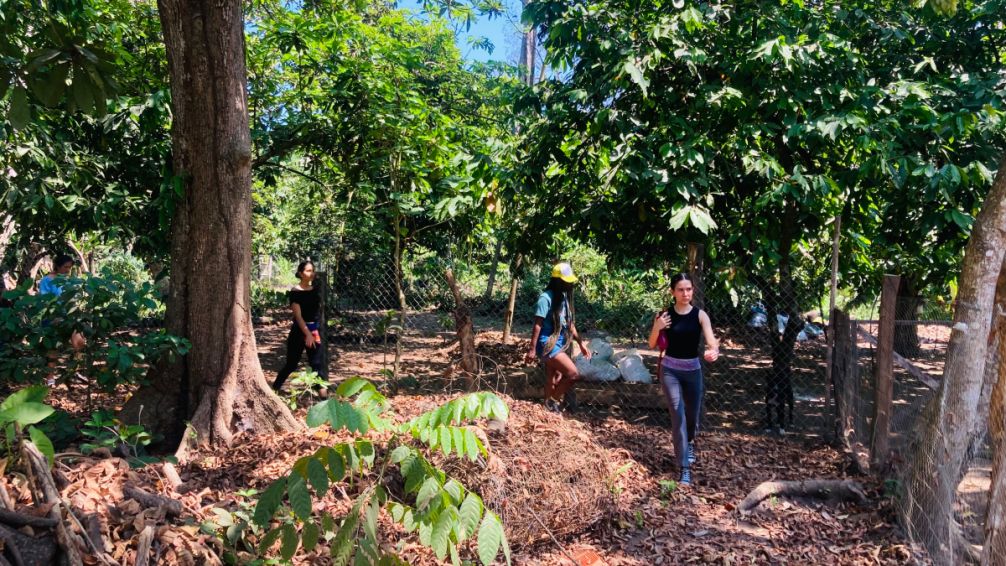
You saw an opportunity to support vulnerable people in Tapachula and responded. You helped set up a farm that provides a local shelter with fresh, nutritious fruit and vegetables while affording refugees the opportunity to learn new skills and earn a stipend by working on the farm. The farm is thriving, and this June, we are planning another food distribution. Food harvested and prepared by our migrant friends will be distributed by them alongside one of our local partners to vulnerable people staying in the streets.
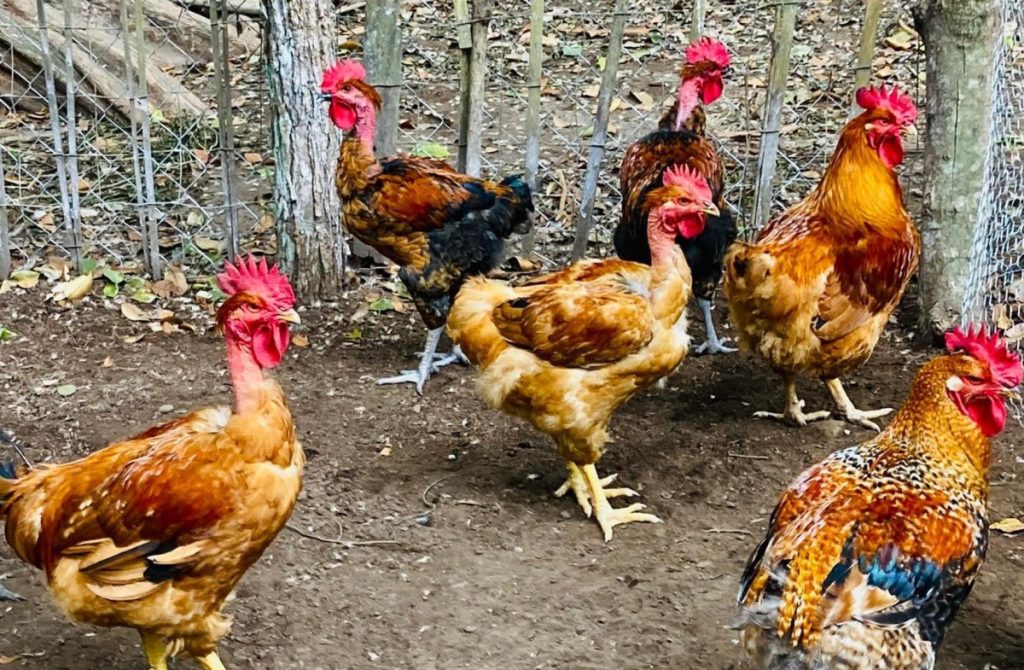
To build financial sustainability into the farm, we added a chicken coop at the beginning of the year. You brought 150 chickens to get the project started, and you’ve added 100 more during the last few months. The chickens are laying eggs, which are incubated until they hatch. We’re excited to see our chicken family has grown to 380 and counting! Unfertilized eggs from the coop offer a delicious source of protein for both our friends at the farm and our migrant friends staying at the shelter.
You recognized that how support is given is essential to maintaining dignity. With our food voucher program, people can shop for what they like and need in a local market. This project is going strong; from February to the beginning of May, 204 people received food vouchers, allowing them to care for themselves and their families.
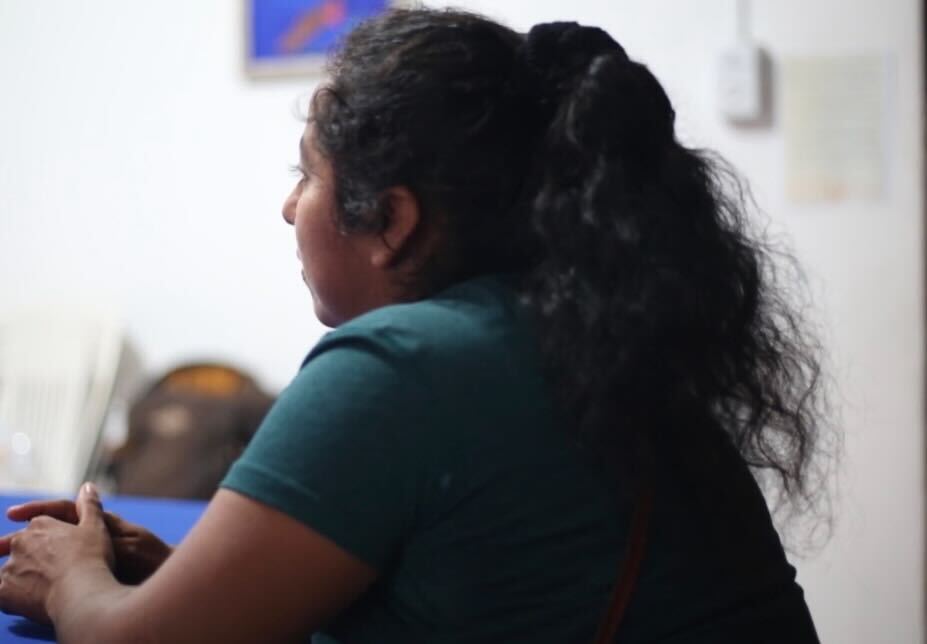
Sara*, a single mom of three, arrived in Tapachula from Guatemala City, where gangs had threatened to kill her family. A local gang had wanted to recruit her eldest son, to which Sara firmly refused. The family fled to Mexico immediately. “When you arrive, you don’t know anything. You don’t know where to go or where to ask [for [help], but thanks to God, there are people with good hearts who assist you, who bring psychological support. And thank God for psychological support and this program; honestly, I didn’t expect this help, but it was something extra. For me, it is a lot. I feel very grateful for this assistance.”
Sara tells us that gangs recruit children as young as ten years old because the police keep youngsters in jail for only ten days if caught. She feared for her middle child, whose education was disrupted when they fled. “Because we left because of fear, taking care of your children, trying to protect and save our children. I have two children very similar in age [one after the other]; one just turned six, not turned seven, and the other is almost ten, 9, or 10 years old. The other one is turning 17. So staying was dangerous because the gangs could hire two of my children. I’m trying to protect them and seek a better future for them. My oldest child was in middle school, and I told him, ‘Son, please be a good student. Make an effort. I want you to become a doctor or get a degree in the future. The things that I didn’t achieve, I want you can achieve it. That’s the reason I work hard because I want you to have everything I didn’t have.’”
“When I arrived in Mexico, I told my children, ok, guys, we will start from nothing. We will have to start selling candies in the streets to get something to eat.” But then, Sara met our local partner and sat down for an interview. She told them she was worried because she didn’t have food for her children. The next week, Sara was enrolled in our food voucher program. She compares getting into the food voucher program to the happiness of Christmas Day.
With the food voucher program, Sara has more time to spend with her children. She sees they are happier in Tapachula than they were in Guatemala City. “And maybe, because [I give them] the time I didn’t have back home, because I was just working, working, and working…Thank God they can be satisfied, and that assistance [vouchers] that you have provided, those groceries, …now I have more time with my kids, and they have something to eat…When my kids happily drink milk or eat something, they tell me, ‘Thanks, Mom.’ It looks like God is so good with us…it’s a huge blessing coming from God and of you.”
As US and Mexico’s immigration policies recalibrate after the lifting of Title 42, migration remains one of the defining issues of our time. Rising levels of poverty and violence in Latin America are causing people like you and me to leave everything they have worked their whole lives to achieve to take better care of themselves and their families. Preemptive Love is responding with stabilizing programming. If you’d like to support dreams, consider making a donation. Follow this blog or our Instagram account to see how your generosity is a lifeline for those in need. Sharing this post reaffirms our shared humanity.
*Not their real names.

